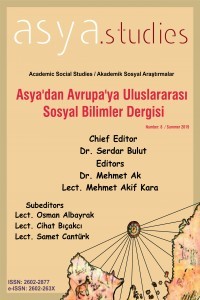
Asya Studies
Yazarlar: Hacı ÖZDEMİR
Konular:Sosyal
DOI:10.31455/asya.612384
Anahtar Kelimeler:Gender,Masculinity Perception,Femininity Perception
Özet: The aim of this study is to reveal the perceptions of masculinity and femininity of university graduate men and to determine the points at which masculinity and femininity perceptions fall outside the traditional gender line. In-depth interviews were conducted with 20 men from various professions in the 30-45 age range within the scope of this basic objective. Phenomenology model was carried out in the study which followed the qualitative method and phenomenological analysis was used in the analysis of the data. As a result of the analysis of the obtained data, it was seen that the perceptions of masculinity and femininity of the interviewees mostly corresponded to the traditional gender line. Masculinity is defined by being physically strong, maintaining a family, heterosexuality, not showing or being unable to show feelings. The ideal man is defined as not needing anyone by providing the financial means of his family. There is a change in perception about circumcision and paternity. Circumcision is not seen as a phenomenon in which masculinity is gained, and the father figure is defined in an active role that guides and takes responsibility for his children, rather than as a passive entity that dominates the children. The main references to femininity are to be delicate, fragile, emotionally and physically beautiful. The most important roles of women are expressed as motherhood and domestic roles. Femininity is an existence that men do not want to be a member of because it has serious difficulties. This is due to the burden of domestic work on women, more exposure to violence and harassment, limited areas of freedom, and unequal gender perception in society. In general, the perception of femininity corresponds to the traditional perception of gender.
Dergi editörleri editör girişini kullanarak sisteme giriş yapabilirler. Editör girişi için tıklayınız.